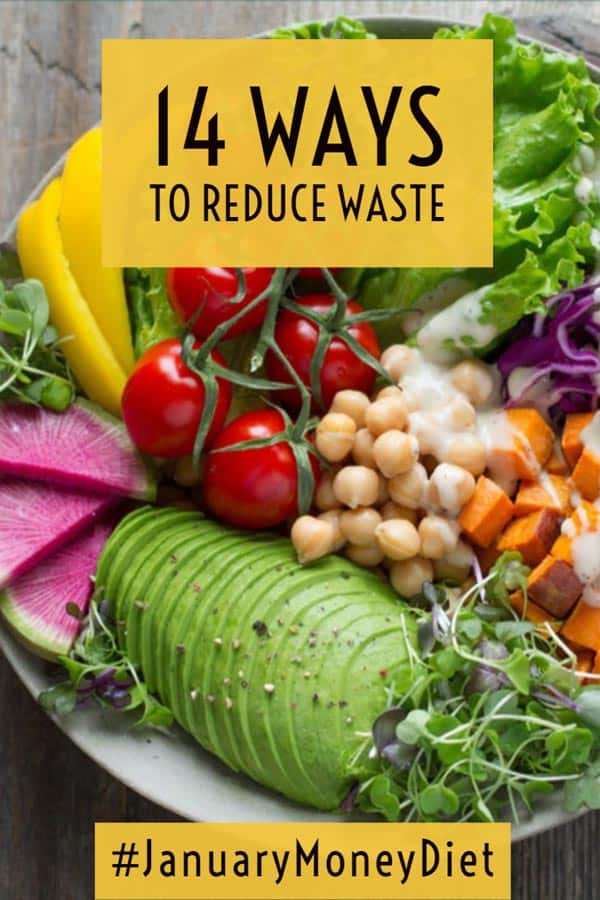Save money and help the planet with these easy ways to reduce waste. Many of us can significantly reduce our monthly expenses without sacrificing one thing. The key is to become more efficient about the way we use our resources and waste less.
When we’re good stewards of what we have, we enjoy the same quality of life — and we have more to share with others.

A Completely Painless Way to Save Money (and the Earth)
According to a recent article in the Washington Post, American families throw out between 14 and 25 percent of the food and beverages they buy, costing the average family between $1,365 and $2,275 each year.
These are some of the things I’ve wasted:
Food – I’ve cooked too much, purchased too much, and forgotten about food. I’ve stored food improperly so it spoiled before we ate it. I feel so terrible when I waste food.
Money – I’ve wasted money on impulse buys, and purchasing things to impress others. I’ve bought things I didn’t really need.
Resources – I’ve left the lights on in an empty room, and let the water run needlessly. I’ve been careless and accidentally left the automatic sprinklers on during a rain storm. I’ve discarded things that someone else could have used.
Time – I’ve wasted time on social media, watching mindless TV, and doing unproductive things like worrying or gossiping.
Practical Strategies for Reducing Waste
Using only what we need can be a wonderful way to stretch our money, honor the earth’s resources, and have more to share with those in need.
What if this was the year we all stopped wasting even one morsel? Let’s do this! Here are some strategies:
Waste Less Food
1. Cook the right amount for your family. If you regularly throw away uneaten portions, recalculate your favorite recipes. Better to eat every bite and occasionally give a family member an apple if he’s still hungry after a meal, than constantly discard leftovers.
2. Take leftovers to work the following day for lunch, and save money on meals out.
3. Reinvent your leftovers in another meal (casserole, stir fry, soup) within a day or two.
4. Freeze leftover meat, veggies, juices, milk, etc. for soups and stews. Do this within a day or two of cooking to preserve quality.
5. Save and freeze the cooking water from vegetables, and use it as a flavor-enhancing base for soups and sauces. Spaghetti sauce freezes well, too.
6. Be aware of small, daily waste. Do you routinely throw away a third cup of coffee from the pot every day? Measure out exactly how much you need and experiment until you find the exact amount that eliminates waste.
7. Save the carcass from a roast chicken or turkey and use it to make a batch of homemade stock or broth.
8. American restaurants are notorious for serving too-large portions. Don’t be shy about asking for a doggie bag at a restaurant. Or consider sharing a meal to eliminate food waste.
9. If they’re too far gone, compost fruits and vegetables that are past their prime.
Conserve Resources
10. Turn off the water while you’re brushing your teeth.
11. Spend 20 minutes retrofitting your toilet with pop bottles and marbles, and you could save 3000 gallons of water a year.
12. Repair drippy faucets and leaky toilets.
13. Only run full loads in the dishwasher and washing machine.
14. Check portions on things like dishwashing soap and laundry detergent, and only fill the measuring cup to the recommended line.
Focus and Waste Less Time
As a self-employed writer, making the most of my time is a daily challenge. Some days I feel so tired at the end of the day, and yet I feel like I accomplished so little. I think many of us feel that way on a regular basis. Perhaps we need to cut ourselves some slack, and get back to basics.
Here’s my simple tip, which I read a long time ago and try to practice every weekday. At the beginning of the day, write down your top three priorities — the three most important things you would feel really good accomplishing today. Then start with the one task on the list that makes you feel the most resistance.
If you get off track browsing Pinterest for donut recipes (speaking for myself), just re-focus on your top three things. Repeat tomorrow.
Regular breaks from the digital world are important, too. Sometimes I have to put my phone in another room so I can focus. I don’t read emails on Sundays, and try to give my brain a rest.
Unplug. If you have something important to communicate, experiment with writing your thoughts longhand in a notebook instead of composing on a computer. I find that my writing is much more authentic when I have that direct connection between my brain and my hand.
How About You?
Is yours a zero-waste home, or is this an area you want to work on? Do you have ideas to add to this list? If you’ve adopted any conservation strategies, will you share them with us over in the Money Diet Community Facebook group?
Here’s to wasting less and sharing more this year.
Best always,

P.S. Tomorrow is our mid-month check in and you won’t want to miss it. HUGE thanks to our wonderful sponsor YourMoneyFurther.com and the Open Your Eyes to a Credit Union campaign. If you’ve been thinking about joining a credit union, you can find one near you with this Credit Union Finder.
P.P.S. If you use Pinterest to save articles and ideas, here’s a handy pin:


Eliza Cross is an author and food blogger who enjoys helping busy people with easy recipes and tips for gardening, holidays, and home. She is the founder of BENSA Bacon Lovers Society and Happy Simple Living, and the award-winning author of 17 cookbooks.




Far from zero waste home, but we do make good use of leftovers. There’s just two of us so we might eat the meal for several nights, then I divide the remainder into individual serving sized containers and freeze them. I take them for work lunches. It’s satisfying to have some lunches to choose from whenever I need one. Beats Lean cuisine!
I decided years ago not to waste food or other things either. Rule for leftovers. If not used in 2 days it gets frozen for a meal later, Keep a list of what you have and then one of the mornings you have plans , pull out one or more of your leftover meals and easy to heat up. We use food saver bags and since we don’t have a microwave and never will you put it in your pot of boiling water and there s your dinner. God bless to all.